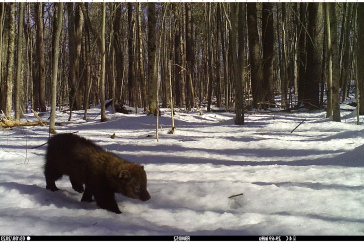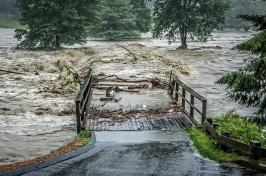New England Fishers Declining in the Granite State - UNH to Study Possible Causes

Fisher caught on wildlife cameras that UNH has strategically set up near Nashua, New Hampshire, to track their habits and numbers in the winter. Fisher populations appear to be coexisting with humans near developed area in southeastern New Hampshire. Photo credit: UNH.
DURHAM, N.H.—The University of New Hampshire has been awarded over $1.2 million to investigate an apparent steady decline of the fisher population in the state of New Hampshire. The grant, from the U.S. Fish and Wildlife Service and N.H. Fish and Game Department, will help UNH researchers investigate the health and mortality of fishers to better understand why these mammals, which can be indicators of forest health, are disappearing.
“Fishers are an important part of the forest ecosystem and tell us a lot about the dynamics of the carnivore community,” said Rem Moll, assistant professor in natural resources and environment. “They help control rodent populations and are also one of the few predators that can successfully hunt porcupines, and that might have benefits for forest health by minimizing bark and tree damage caused by porcupines.”
Along with wildlife cameras set up in forests around the state, researchers will track the population by outfitting them with GPS collars to better track and monitor survival and field mortalities. The collars will also include transmitters with mortality sensors for field recovery. N.H. Veterinary Diagnostics Laboratory (NHVDL) at UNH will then analyze pathology results to look for any toxins, blood-borne pathogens, bacteria and other data that could identify disease in tissue. The goal is to help determine specific causes of mortality and provide a comprehensive set of tools to assess the health of the Granite state’s fisher population.
“Recent testing in our lab has found a high level of rodenticides, a specific pesticide used to control rodents, in New England fishers and we’ll be looking for data on that as well as any other specific diseases, using tests like blood work, to look for any trends in overall survival rates,” said David Needle, pathology section chief at NHVDL and clinical associate professor.
Researchers say there a number of factors that could be threatening the New England fisher. Wildlife cameras show that fisher populations appear to coexist with humans near developed areas in southeastern NH. That increases the possibility that rodenticides could play a role in fisher mortality because of its common use, especially when closing up summer homes for the winter season. Rodents who are exposed to the pesticide can be prey for the fishers and may in turn cause them harm as well. Historically, fishers have also been highly valued for their fur, which is still true today but on a smaller scale.
The University of New Hampshire inspires innovation and transforms lives in our state, nation and world. More than 16,000 students from 49 states and 82 countries engage with an award-winning faculty in top-ranked programs in business, engineering, law, health and human services, liberal arts and the sciences across more than 200 programs of study. A Carnegie Classification R1 institution, UNH partners with NASA, NOAA, NSF, and NIH, and received over $210 million in competitive external funding in FY23 to further explore and define the frontiers of land, sea and space.
IMAGES FOR DOWNLOAD
http://cenm.us1788.com/unhtoday/sites/default/files/fish_2.png
Caption: Fisher caught on wildlife cameras that UNH has strategically set up near Nashua, N.H. to track their habits and numbers in the winter. Fisher populations appear to be coexisting with humans near developed area in southeastern NH.
Photo credit: UNH
http://cenm.us1788.com/unhtoday/sites/default/files/fisher_bear_brook.jpg
Caption: Adult fisher tracked on UNH wildlife camera in the fall as it walked through Bear Brook State Park in Allenstown, N.H.
Photo credit: UNH
http://cenm.us1788.com/unhtoday/sites/default/files/fisher_fbm061_2021-08-16_18-55-574.jpg
Caption: A family of fishers caught on a UNH wildlife camera playing in a wooded area on UNH's Kingman Farm. These images suggest fishers are successfully breeding at this location.
Photo credit: UNH
http://cenm.us1788.com/unhtoday/sites/default/files/fisher_img_0881_fisher.jpg
Caption: Eagle-eyed fisher caught on a UNH wildlife camera hunting in a wooded area of New Hampshire near Exeter.
Photo credit: UNH
Latest News
-
December 12, 2024
-
December 11, 2024
-
November 22, 2024
-
November 7, 2024
-
October 30, 2024
















































